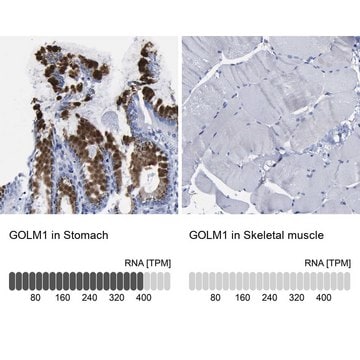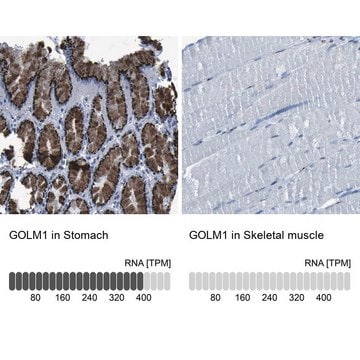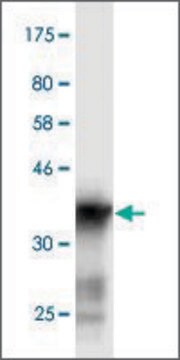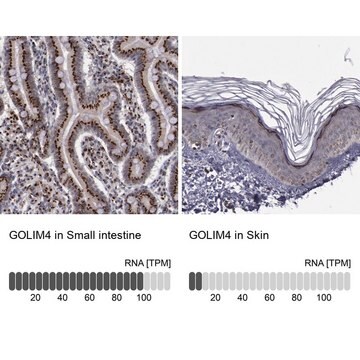MABC1117
Anti-GOLM1 Antibody, clone 6A2
clone 6A2, from mouse
Sinónimos:
Golgi membrane protein 1, Golgi membrane protein GP73, Golgi phosphoprotein 2
About This Item
Productos recomendados
biological source
mouse
antibody form
purified antibody
antibody product type
primary antibodies
clone
6A2, monoclonal
species reactivity
human
packaging
antibody small pack of 25 μg
technique(s)
ELISA: suitable
immunohistochemistry: suitable (paraffin)
immunoprecipitation (IP): suitable
western blot: suitable
isotype
IgG1κ
NCBI accession no.
UniProt accession no.
target post-translational modification
unmodified
Gene Information
human ... GOLM1(51280)
General description
Specificity
Immunogen
Application
Enzyme Immunoassay Analysis: A representative lot detected GOLM1 in ELISA applications (Zhang, A., et. al. (2012). J Biomed Res. 26(6):467-73).
Immunohistochemistry (Paraffin) Analysis: A representative lot detected GOLM1 in Immunohistochemistry applications (Zhang, A., et. al. (2012). J Biomed Res. 26(6):467-73).
Immunoprecipitation Analysis: A representative lot immunoprecipitated GOLM1 in Immunoprecipitation applications (Zhang, A., et. al. (2012). J Biomed Res. 26(6):467-73).
Western Blotting Analysis: A representative lot detected GOLM1 in Western Blotting applications (Zhang, A., et. al. (2012). J Biomed Res. 26(6):467-73).
Apoptosis & Cancer
Quality
Immunohistochemistry (Paraffin) Analysis: A 1:250 dilution of this antibody detected GOLM1 in human prostate cancer tissue sections.
Target description
Physical form
Storage and Stability
Other Notes
Disclaimer
¿No encuentra el producto adecuado?
Pruebe nuestro Herramienta de selección de productos.
Certificados de análisis (COA)
Busque Certificados de análisis (COA) introduciendo el número de lote del producto. Los números de lote se encuentran en la etiqueta del producto después de las palabras «Lot» o «Batch»
¿Ya tiene este producto?
Encuentre la documentación para los productos que ha comprado recientemente en la Biblioteca de documentos.
Nuestro equipo de científicos tiene experiencia en todas las áreas de investigación: Ciencias de la vida, Ciencia de los materiales, Síntesis química, Cromatografía, Analítica y muchas otras.
Póngase en contacto con el Servicio técnico








